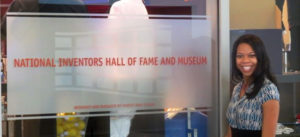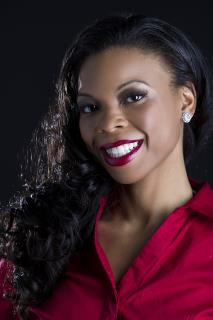
[Update, August 2020]: We caught up with Tynesha to hear about what she’s accomplished since our last interview with her. She’s still a Patent Examiner with the USPTO and cheered for the Baltimore Ravens! Read her update interview, here!
Tynesha is one of the Science Cheerleaders who will be appearing at the National Science Foundation’s Change the World Career Fair in Dulles, Virginia this Saturday, September 28.
What turned you on to science and when?
I was fascinated with science, especially chemistry, ever since middle school. In middle school, I was one of the top 10 students in my chemistry class and was taken on a field trip to a chemical plant (Aristech Chemical Corporation) in Pittsburgh, PA. I was also infatuated with Bill Nye the Science Guy as well as Alton Brown, the creator and star of the show Good Eats. The thing I love most about science is the problem solving aspect of it. Being able to figure out a solution to something with a certain amount of information and clues is very rewarding to me.
What is your degree in and from where?
Bachelor of Science in Chemistry with a minor in Mathematics at James Madison University.
Favorite and/or most challenging courses you took to prepare for your degree? Why?
My favorite course was Analytical Chemistry for sure. It was right up my alley in terms of chemistry and mathematics by having a mixture of calculations and reviewing the data and findings of your experiments.
You’re working as a Food Technology/Chemistry Patent Examiner for the U.S. Patent and Trademark office (USPTO). What got you interested in that?
Prior to working at the USPTO, I was a high school chemistry teacher. I quickly figured out the students really enjoyed food. Since there are a variety of chemical concepts in foodstuff, I would correlate my curriculum with food, and on occasions, the students were able to eat the results. This along with my own curiosity in how things are made led me right to the Patent Office.
What’s the most unusual item you ever reviewed for a patent?
The most unusual patent I’ve allowed was an oleaginous film for separating food, such as frozen patties, prepared by contacting oil directly with a flame. Check it out! US 8124153.
Best part of your day job?
Researching! It so much fun seeing what is out there and what scientists are working on.
You cheer for the Baltimore Blast. How long have you cheered for them, and why did you try out to be a professional cheerleader for a U.S. soccer team?
This is my rookie year for the Blast. I’ve been dancing since I was in middle school. I would watch the professional cheerleaders on television, but there weren’t any professional teams to audition for in Pittsburgh, PA where I am originally from. Once I moved to the Baltimore/Washington, DC area after college and was established with my career, I figured it was finally worth a try!
Which came first, your interest in science or cheerleading?
I’d have to say cheerleading. My mother made me tryout for cheerleading when I was around 6 years old. After getting involved, I really liked it!
What do you do?
The role of a patent examiner is to review a patent applicant submitted by an inventor to determine whether or not their invention is unique. If the invention is unique, then I approve their patent request. This approval means no one else will be able to take credit for the inventor’s unique invention. I spend most of my time researching patents, research papers, and scientific journals to ensure there is not an identical invention. We have various databases, the internet, and several libraries on campus to search from. If there is an identical invention, I produce a report stating the related invention and give it to the inventor of the patent application.
What does it mean for you to be a patent examiner?
Being a patent examiner is a huge responsibility. In many instances, an inventor may have investors pending the allowance of a patent. These investments are critical as they provide the inventor with the necessary funds to produce more products as well as create jobs thus stimulating the economy.
How do the qualities that make you a great cheerleader benefit you in your science career?
Cooperativeness and rationalism are features I find beneficial as a cheerleader and a patent examiner. As a cheerleader, mishaps occur. Working together with your teammates and resolving the issue are necessary even if there are only few seconds to correct it. As a patent examiner, there are times you may not know exactly where to start researching due to the overlap between the different scientific fields. Other times, there is an overwhelming amount of information to review. In these cases, it’s helpful to talk with scientists in chemistry as well as in other disciplines and determine a reasonable approach to the situation at hand.
There are stereotypes about cheerleaders in our society that make it seem unlikely that a cheerleader could be a scientist. Obviously these stereotypes are untrue, and you are a great example of that. How do you feel about breaking down negative stereotypes about cheerleaders? Have you faced a where you had to challenge a stereotype about cheerleaders [or scientists]?
I feel it is extremely important to break down all unfair stereotypes. A common misconception about being a cheerleader is that it isn’t difficult when, in fact, it really does require work and time management. The field of science, and particularly chemistry, is often dominated by men, and I take great pride in my ability to serve as a chemist by day and lace up my dancing boots at night.
Best cheerleading experience?
To date, my best cheerleading experience was when we were invited to a cheerleading clinic at a public school in Baltimore city. It was quite rewarding to assist enthusiastic, young ladies on cheerleading and dancing technique. There is nothing more fulfilling than excited students eager to learn.
Best science-related experience?
When I was in college, I participated in James Madison University’s Research Experience for Undergraduates program (REU) during one summer break. While my research was for the Materials Science department, I also collaborated with students and professors of other scientific disciplines including biology, chemistry, and physics, to name a few. I realized how crucial teamwork truly is in science.
If you could rewind the clock and change your degree, would you? If so, to what and why? If not, why not?
No. It was challenging at times, but I never gave up. It taught me to be relentless and remain ambitious in all aspects of life.
What advice would you give your 12-year-old self?
Pray faithfully, work tirelessly, and focus intensively.
What’s one thing people might find especially surprising about you?
My age. I look younger than I really am.
Apart from work and cheering, what are some of your favorite activities?
I absolutely love to travel as much as possible with my family. In the last 3 years, I have traveled to Hawaii, St. Thomas, and Europe including attending the 2012 Summer Olympics in London. My favorite foods are Italian cuisine, frozen yogurt, and anything with the word “cake” in it .
What are your plans for the future?
My plans are to continue dancing as long as I can as well as to continue encouraging and promoting science and innovation among people of all ages.
Why do you want to be a Science Cheerleader?
I would like to inspire young women to be anything they want to be despite what others may say or the tribulations encountered along the way. You don’t have to give up a career in science to be a cheerleader or vice versa. Concurrently pursuing your passion in science and cheerleading is possible to achieve.


I’m so happy I got to meet you today at the USA science and engineering festival in DC. I am inspired to continue cheerleading and have another career when I grow up. I learned today that I can do both.